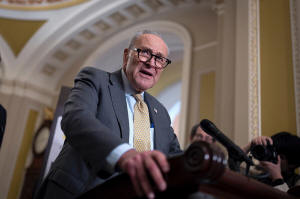Senate Democrats, holding out for health care, reject government funding
bill for 10th time
[October 17, 2025]
By STEPHEN GROVES and MARY CLARE JALONICK
WASHINGTON (AP) — Senate Democrats rejected for the 10th time Thursday a
stopgap spending bill that would reopen the government, insisting they
won’t back away from demands that Congress take up health care benefits.
The vote failed on a 51-45 tally, well short of the 60 needed to advance
with the Senate's filibuster rules.
The repetition of votes on the funding bill has become a daily drumbeat
in Congress, underscoring how intractable the situation has become. It
has been at times the only item on the agenda for the Senate floor,
while House Republicans have left Washington altogether. The standoff
has lasted over two weeks, leaving hundreds of thousands of federal
workers furloughed, even more without a guaranteed payday and Congress
essentially paralyzed.
“As we are positioning as two sides that are seemingly dug in on this
16th day of a shutdown, real people are wondering is their government
going to be there for them?” said GOP Sen. Lisa Murkowski of Alaska.
The shutdown is on track to surpass the 16-day closure in 2013, which
was also a debate over the Affordable Care Act. The longest shutdown
ended in 2019, after 35 days.
While the military was paid this week, it's unclear how long that will
last. The White House budget office told Congress that it cost $6.5
billion to cover this one pay period. The next one is two weeks.
Senate Majority Leader John Thune again and again has tried to pressure
Democrats to break from their strategy of voting against the stopgap
funding bill. It hasn't worked. And while some bipartisan talks have
been ongoing about potential compromises on health care, they haven't
produced any meaningful progress toward reopening the government.

“The Democratic Party is the party that will not take yes for an
answer,” Thune, a South Dakota Republican, said in an angry speech on
the Senate floor.
He had also offered to hold a later vote on extending subsidies for
health plans offered under Affordable Care Act marketplaces, but said he
would not “guarantee a result or an outcome.”
Democrats say they won't budge until they get a guarantee on extending
the tax credits for the health plans. They warn that millions of
Americans who buy their own health insurance — such as small business
owners, farmers and contractors — will see large increases when premium
prices go out in the coming weeks. Looking ahead to a Nov. 1 deadline in
most states, they think voters will demand that Republicans enter into
serious negotiations.
"The ACA crisis is looming over everyone’s head, and yet Republicans
seem ready to let people’s premiums spike,” said Senate Democratic
leader Chuck Schumer in a floor speech.
Meanwhile, Thune tried a different tack Thursday with a vote to proceed
to appropriations bills — daring Democrats to vote against funding
legislation for the Department of Defense. They also voted that down.
A deadline for subsidies on health plans
Democrats have rallied around their priorities on health care as they
hold out against voting for a Republican bill that would reopen the
government. Yet they also warn that the time to strike a deal to prevent
large increases for many health plans is drawing short.
When they controlled Congress during the pandemic, Democrats boosted
subsidies for Affordable Care Act health plans. It pushed enrollment
under President Barack Obama's signature health care law to new levels
and drove the rate of uninsured people to a historic low. Nearly 24
million people currently get their health insurance from subsidized
marketplaces, according to health care research nonprofit KFF.
Democrats — and some Republicans — are worried that many of those people
will forgo insurance if the price rises dramatically. While the tax
credits don't expire until next year, health insurers will soon send out
notices of the price increases. In most states, they go out Nov. 1.
[to top of second column]
|

Senate Minority Leader Chuck Schumer, D-N.Y., meets with reporters
to talk about the struggle to end the government shutdown, at the
Capitol in Washington, Wednesday, Oct. 15, 2025. (AP Photo/J. Scott
Applewhite)

Sen. Patty Murray, the top Democrat on the Senate Appropriations
Committee, said she has heard from “families who are absolutely
panicking about their premiums that are doubling."
“They are small business owners who are having to think about
abandoning the job they love to get employer-sponsored health care
elsewhere or just forgoing coverage altogether,” she added.
Some Republicans have acknowledged that the expiration of the tax
credits could be a problem and floated potential compromises to
address it, but there is hardly a consensus among the GOP.
House Speaker Mike Johnson, R-La., this week called the COVID-era
subsidies a "boondoggle.”
President Donald Trump has said he would “like to see a deal done
for great health care,” but has not meaningfully weighed into the
debate. And Thune has insisted that Democrats first vote to reopen
the government before entering any negotiations on health care.
If Congress were to engage in negotiations on significant changes to
health care, it would likely take weeks, if not longer, to work out
a compromise.
Appropriations bills vote
Meanwhile, Senate Republicans held a vote to proceed to a bill to
fund the Defense Department and possibly several other areas of
government. This would have turned the Senate to Thune's priority of
working through spending bills and potentially paved the way to
paying salaries for troops, though the House would have eventually
needed to come back to Washington to vote for a final bill
negotiated between the two chambers.
It would have potentially put a crack in Democrats' resolve, but the
vote on the procedure failed 50-44 with Sens. Catherine Cortez Masto,
John Fetterman and Jeanne Shaheen the only Democrats voting in
favor.
“This is politics. If anything was needed to demonstrate just how
fundamentally uninterested Democrats are in supporting our troops
and defending our country, just take a look at this vote,” Thune
yelled on the Senate floor following the vote.
Democrats charged that Republicans had abandoned bipartisanship in
the appropriations process, potentially leaving out funding for
other areas of government that are priorities for them.

“We believe that we need a strong defense, but we believe we need
strong health care, we need strong safety for the American people,
we need strong programs that help them with so many other issues,
mental health and education,” Schumer said Thursday.
Connecticut Sen. Chris Murphy, a Democratic member of the Senate
Appropriations Committee, said that he wouldn't vote to “move
forward on appropriations bills until they’re serious about stopping
health care premiums from going up.”
The episode made it clear that the Senate leaders are not talking
with each other and left Capitol Hill with a growing sense that an
end to the stasis is nowhere in sight.
“So many of you have asked all of us, how will it end?" Johnson
said, “We have no idea.”
___
Associated Press writer Kevin Freking contributed to this report.
All contents © copyright 2025 Associated Press. All rights reserved |